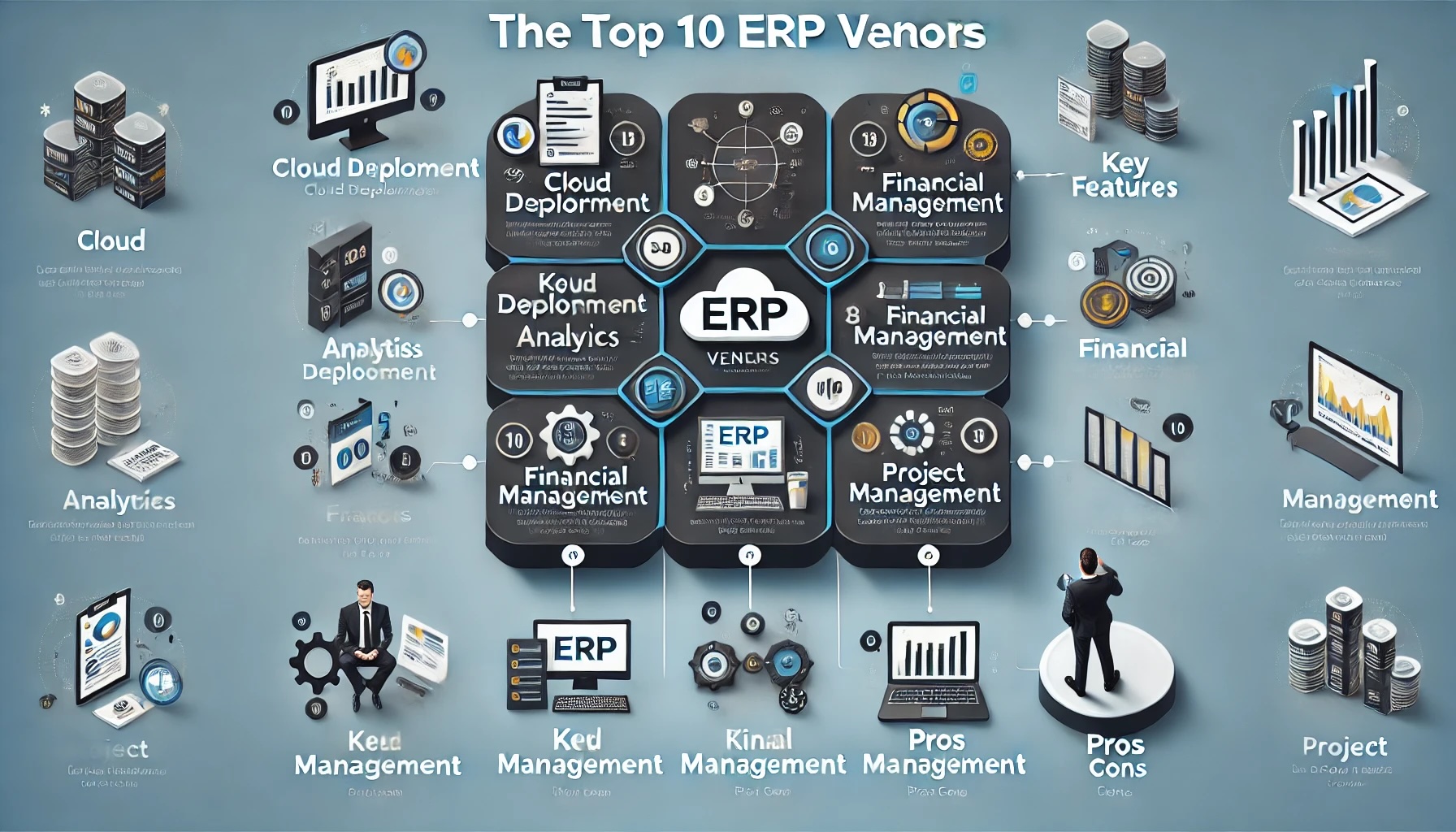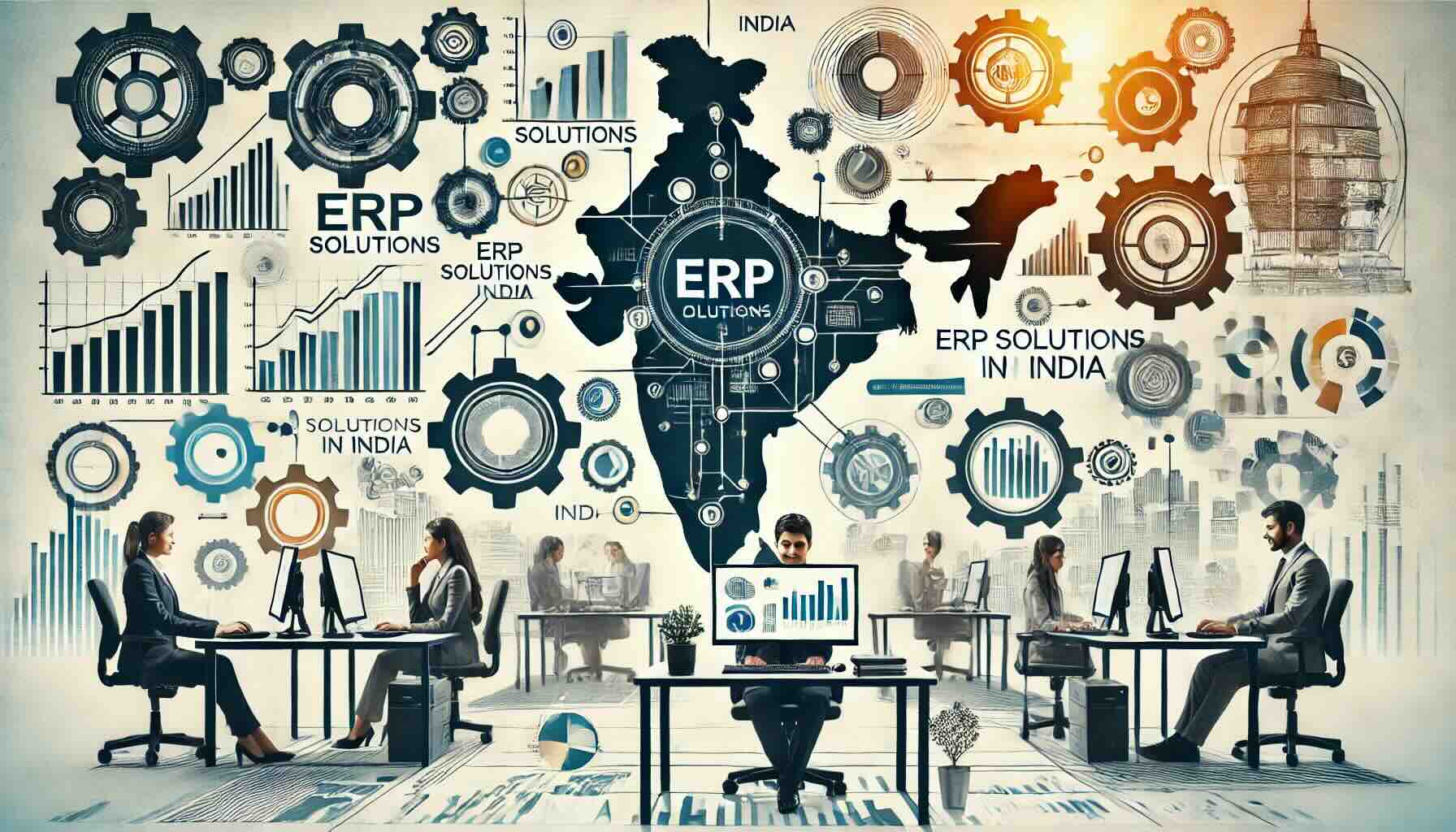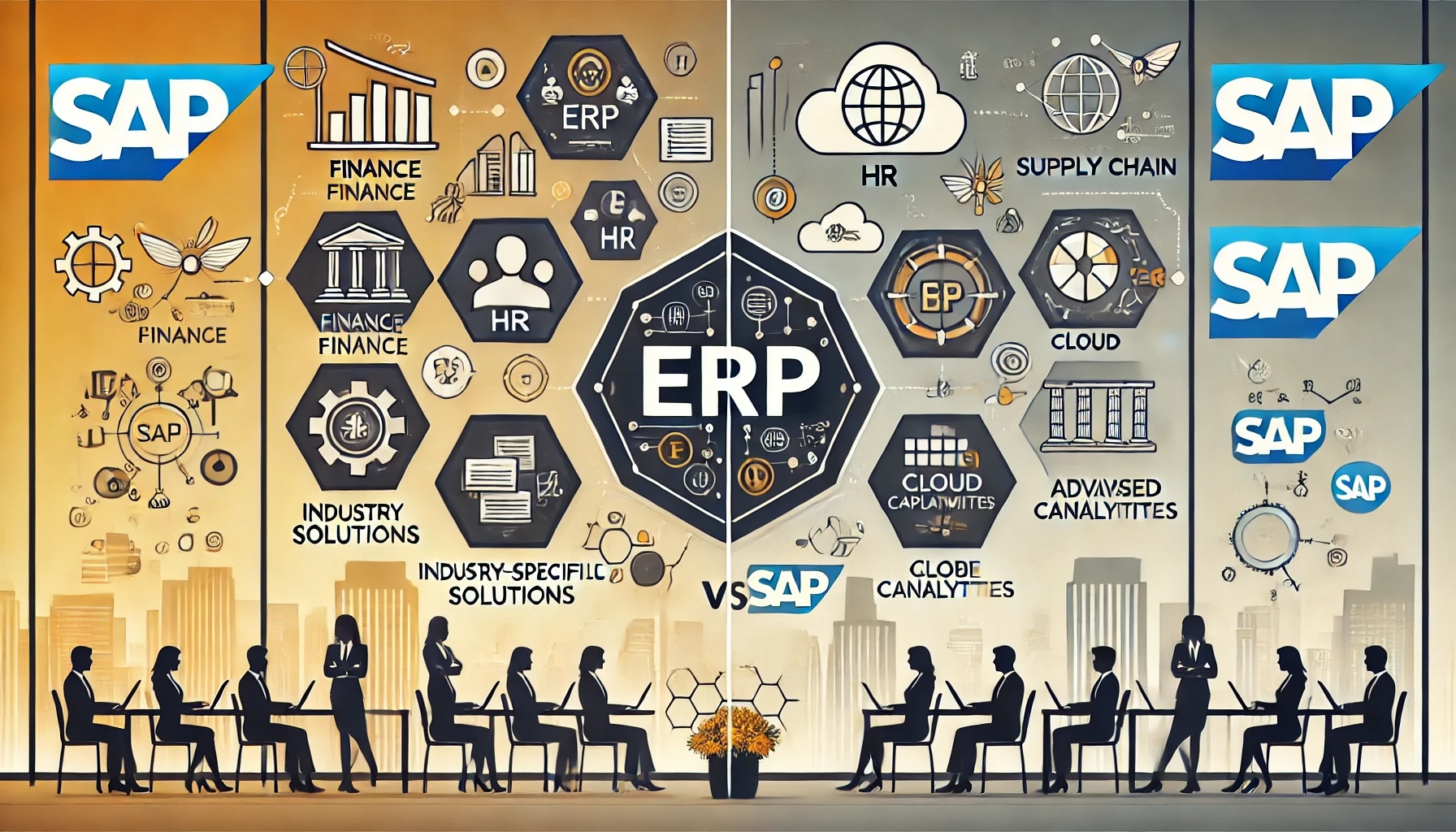Compare the Top 10 ERP Vendors

In today’s competitive business landscape, selecting the right Enterprise Resource Planning (ERP) system is crucial for streamlining operations, improving efficiency, and gaining a competitive edge. With numerous options available, choosing the best ERP solution can be daunting. An ERP system integrates various functions of a business, such as finance, human resources, supply chain, and customer relations, into a single unified system, ensuring seamless data flow and enhanced decision-making capabilities. The right ERP solution can transform your business operations, drive innovation, and provide real-time insights that are critical for strategic planning. However, the wrong choice can lead to costly implementations, inefficiencies, and potential disruptions.
As businesses vary in size, industry, and operational requirements, it is essential to choose an ERP system that aligns with your specific needs. Whether you are a small business looking to streamline your processes or a large enterprise aiming for a more integrated and scalable solution, understanding the features, advantages, and drawbacks of the leading ERP vendors is vital. In this blog, we will compare the top 10 ERP vendors to help you navigate through the options and make an informed decision that will support your business’s growth and efficiency. Let’s delve into the strengths and weaknesses of each to find the best fit for your organization.
1. SAP
Overview
SAP, founded in 1972, is one of the most established and widely recognized ERP vendors globally. The company’s flagship product, SAP S/4HANA, is a next-generation ERP suite designed to help businesses run simple in a digital and networked world. SAP S/4HANA leverages the SAP HANA in-memory database, offering real-time processing and analytics capabilities. The platform is designed to cover all day-to-day processes of an enterprise, from procurement and manufacturing to service and sales, all the way to finance.
SAP provides industry-specific solutions tailored to the needs of various sectors, such as manufacturing, retail, healthcare, and utilities. With a focus on integrating data from various sources and providing advanced analytics, SAP enables businesses to make more informed decisions and drive growth. Its robust ecosystem includes a wide range of modules and applications that can be customized to meet the unique needs of different organizations.
Key Features
- Real-time data processing with SAP HANA: Leverages in-memory computing to provide instant insights and analytics.
- Comprehensive industry-specific solutions: Tailored modules for industries such as manufacturing, retail, and healthcare.
- Advanced analytics and reporting tools: Includes predictive analytics and machine learning to drive smarter decisions.
- Scalable and flexible architecture: Supports both cloud and on-premises deployments to fit various business needs.
Pros
- Extensive customization options: Highly adaptable to specific business processes and requirements.
- Strong global presence and support network: Extensive customer support and a large community of users.
- Robust integration capabilities: Seamlessly integrates with other SAP products and third-party applications.
Cons
- High implementation and maintenance costs: Can be expensive to deploy and maintain, especially for small businesses.
- Complexity may require extensive training: Users may need significant training to fully leverage its capabilities.
2. Oracle
Overview
Oracle Corporation, established in 1977, is a multinational computer technology company known for its comprehensive suite of enterprise software products and cloud services. Oracle ERP Cloud, their flagship ERP solution, offers a broad set of applications that deliver a consistent user experience and are designed to drive efficiency and innovation.
Oracle’s ERP solutions are known for their robust financial management capabilities, comprehensive suite of cloud applications, and advanced analytics powered by AI and machine learning. Oracle ERP Cloud supports various business functions including finance, project management, procurement, risk management, and supply chain management. The platform is designed to help organizations of all sizes streamline their operations, reduce costs, and make data-driven decisions.
Key Features
- Comprehensive suite of cloud applications: Includes financial management, supply chain management, and more.
- Strong financial management tools: Advanced features for budgeting, forecasting, and compliance.
- Advanced analytics and AI-driven insights: Uses AI and machine learning to provide deeper business insights.
- High scalability and flexibility: Suitable for businesses of all sizes, with options to expand as needed.
Pros
- Seamless integration with other Oracle products: Works well with Oracle’s database and other enterprise solutions.
- Strong security features: Robust security measures to protect sensitive data.
- Excellent support and community resources: Extensive documentation, training, and community forums.
Cons
- Complex implementation process: May require significant time and resources to implement.
- Higher cost compared to some competitors: Can be more expensive, particularly for small and medium-sized businesses.
3. Microsoft Dynamics 365
Overview
Microsoft Dynamics 365, part of the Microsoft ecosystem, is a cloud-based suite of ERP and CRM applications. Launched in 2016, Dynamics 365 combines the capabilities of ERP and CRM, providing a unified platform for managing business operations, customer relationships, and data analytics. This integration allows for a more seamless flow of information across different business functions, improving efficiency and decision-making.
Dynamics 365 is designed to be user-friendly and easily integrates with other Microsoft products, such as Office 365 and Azure. It offers a range of applications for various business needs, including finance, sales, customer service, operations, and talent management. The platform leverages advanced AI and machine learning technologies to provide predictive insights and automation, helping businesses stay ahead of the competition.
Key Features
- Integration with Office 365 and other Microsoft tools: Enhances productivity and collaboration.
- User-friendly and intuitive interface: Easy to navigate and use, reducing the learning curve.
- Advanced AI and machine learning capabilities: Provides intelligent insights and automation.
- Flexible deployment options: Available as cloud, on-premises, or hybrid solutions.
Pros
- Easy to use and adopt: Familiar interface for users already accustomed to Microsoft products.
- Strong focus on AI and analytics: Helps businesses leverage data for better decision-making.
- Cost-effective for small and medium-sized businesses: Competitive pricing with various licensing options.
Cons
- Limited customization compared to some competitors: May not offer as much flexibility for highly specialized needs.
- May require third-party applications for certain functionalities: Additional costs for specific modules or integrations.
4. Infor
Overview
Infor, founded in 2002, provides industry-specific cloud applications that are designed to address the unique challenges of various sectors. Infor CloudSuite, their flagship ERP solution, offers a comprehensive suite of applications that help businesses streamline their operations, improve efficiency, and drive growth. Infor’s ERP solutions are built on the Infor OS platform, which integrates data, advanced analytics, and machine learning capabilities.
Infor’s industry-specific approach ensures that their ERP solutions are tailored to meet the specific needs of industries such as manufacturing, healthcare, retail, and public sector. Infor CloudSuite provides a user-friendly interface and is designed to be easily scalable, making it suitable for businesses of all sizes. The platform’s advanced analytics and reporting tools help businesses gain insights into their operations and make data-driven decisions.
Key Features
- Industry-specific functionalities: Customized solutions for industries like healthcare, manufacturing, and retail.
- Advanced analytics and reporting tools: Provides detailed reports and dashboards for better decision-making.
- Cloud-based deployment for easy scalability: Offers flexibility to scale resources as needed.
- Strong focus on user experience: Intuitive design and ease of use.
Pros
- Highly customizable: Can be tailored to meet specific business requirements.
- Strong focus on specific industries: Deep expertise and tailored solutions for various sectors.
- Competitive pricing: Attractive pricing models for different business sizes.
Cons
- Limited global presence compared to SAP and Oracle: Smaller support network and fewer resources in some regions.
- May require extensive customization for some industries: Additional costs and time for custom development.
5. NetSuite
Overview
NetSuite, acquired by Oracle in 2016, is a leading cloud-based ERP solution designed for small to mid-sized businesses. Founded in 1998, NetSuite offers a comprehensive suite of applications that cover all essential business processes, including financial management, CRM, e-commerce, and inventory management. NetSuite’s integrated platform provides real-time visibility into business performance, enabling businesses to make informed decisions and drive growth.
NetSuite’s cloud-based architecture ensures that businesses can easily scale their operations as they grow. The platform is designed to be user-friendly and offers a range of customization options to meet the specific needs of different industries. With its robust financial management capabilities and advanced analytics, NetSuite is an ideal solution for businesses looking to streamline their operations and improve efficiency.
Key Features
- Fully integrated cloud ERP solution: Combines financials, CRM, e-commerce, and more in one platform.
- Real-time visibility and analytics: Provides instant access to critical business data.
- Advanced financial management tools: Features for budgeting, forecasting, and financial reporting.
- Scalable and flexible architecture: Can grow with your business needs.
Pros
- Easy to implement and use: Quick deployment and user-friendly interface.
- Strong focus on mid-sized businesses: Tailored for the needs of growing companies.
- Competitive pricing: Affordable options for small and medium-sized businesses.
Cons
- Limited functionality for very large enterprises: May not meet the complex needs of large corporations.
- May require additional modules for specific needs: Potential extra costs for specialized features.
6. Epicor
Overview
Epicor, founded in 1972, provides ERP solutions designed for manufacturing, distribution, retail, and services industries. Epicor ERP is known for its robust features that are tailored to the unique needs of these sectors, helping businesses streamline their operations, improve efficiency, and drive growth. Epicor’s ERP solutions are built on a flexible and scalable architecture, allowing businesses to easily adapt to changing market conditions.
Epicor’s strong focus on manufacturing and distribution makes it a preferred choice for businesses in these industries. The platform offers advanced production and supply chain management tools, including inventory management, production planning, and real-time analytics. Epicor ERP’s user-friendly interface and comprehensive reporting capabilities help businesses gain insights into their operations and make data-driven decisions.
Key Features
- Industry-specific functionalities: Tailored features for manufacturing, distribution, and retail.
- Advanced production and supply chain management tools: Includes inventory management, production planning, and more.
- Real-time analytics and reporting: Provides insights into business performance.
- Scalable cloud and on-premises deployment options: Flexible deployment to suit various business models.
Pros
- Strong focus on manufacturing and distribution: Deep expertise in these industries.
- Highly customizable: Adaptable to specific business processes.
- Competitive pricing: Attractive pricing models for different business sizes.
Cons
- Limited global presence: Smaller support network and fewer resources in some regions.
- May require extensive customization for some industries: Additional costs and time for custom development.
7. IFS
Overview
IFS, founded in 1983, offers a comprehensive suite of ERP applications designed for industries such as aerospace, defense, and energy. IFS Applications provide advanced features for project-based businesses, helping them streamline their operations, improve efficiency, and drive growth. IFS’s ERP solutions are built on a flexible and scalable architecture, allowing businesses to easily adapt to changing market conditions.
IFS’s strong focus on project-based businesses makes it a preferred choice for industries such as aerospace, defense, and energy. The platform offers robust project management tools, including project planning, execution, and monitoring. IFS Applications’ real-time analytics and reporting capabilities help businesses gain insights into their operations and make data-driven decisions.
Key Features
- Industry-specific solutions: Tailored functionalities for sectors like aerospace, defense, and energy.
- Strong project management tools: Includes project planning, execution, and monitoring.
- Real-time analytics and reporting: Provides insights into project performance and business operations.
- Scalable and flexible deployment options: Available as cloud or on-premises solutions.
Pros
- Highly customizable for specific industries: Adaptable to unique business requirements.
- Strong focus on project-based businesses: Deep expertise and tailored solutions.
- Competitive pricing: Attractive pricing models for different business sizes.
Cons
- Limited presence in some regions: Smaller support network and fewer resources in certain areas.
- May require extensive customization for certain needs: Additional costs and time for custom development.
8. Sage
Overview
Sage Group, founded in 1981, offers ERP solutions primarily designed for small and medium-sized businesses. Sage X3, their flagship ERP product, provides comprehensive features and flexibility for growing companies. Sage ERP solutions are known for their robust financial management capabilities, ease of use, and scalability.
Sage X3 integrates various business functions, including finance, sales, inventory, and manufacturing, into a single platform. The cloud-based architecture of Sage X3 ensures that businesses can easily scale their operations as they grow. The platform’s advanced analytics and reporting tools help businesses gain insights into their operations and make data-driven decisions. Sage X3’s user-friendly interface and customizable features make it an ideal solution for small and medium-sized businesses looking to streamline their operations and improve efficiency.
Key Features
- Comprehensive financial management tools: Includes budgeting, forecasting, and financial reporting.
- Scalable cloud and on-premises deployment options: Flexible deployment to suit various business models.
- Advanced analytics and reporting: Provides insights into business performance.
- Integration with other Sage products: Seamlessly works with Sage’s suite of business applications.
Pros
- Easy to implement and use: Quick deployment and user-friendly interface.
- Strong focus on small and medium-sized businesses: Tailored for the needs of growing companies.
- Competitive pricing: Affordable options for small and medium-sized businesses.
Cons
- Limited functionality for very large enterprises: May not meet the complex needs of large corporations.
- May require additional modules for specific needs: Potential extra costs for specialized features.
9. Workday
Overview
Workday, founded in 2005, is a leading provider of cloud-based ERP solutions known for its strong human capital management (HCM) and financial management capabilities. Workday ERP is designed to help businesses streamline their HR and financial operations, improve efficiency, and drive growth. The platform’s unified approach to HCM and financial management ensures that businesses can manage their workforce and financial operations from a single, integrated system.
Workday ERP leverages advanced analytics and machine learning to provide predictive insights and automation, helping businesses make data-driven decisions. The platform’s user-friendly interface and cloud-based architecture ensure that businesses can easily scale their operations as they grow. Workday’s strong focus on HCM and financial management makes it an ideal solution for businesses looking for a unified platform to manage their HR and financial operations.
Key Features
- Unified HCM and financial management: Combines HR and financial operations in one platform.
- Advanced analytics and reporting: Provides insights into workforce and financial performance.
- Cloud-based deployment for easy scalability: Flexible deployment to suit various business models.
- User-friendly interface: Intuitive design and ease of use.
Pros
- Strong focus on HR and finance: Deep expertise in human capital and financial management.
- Easy to implement and use: Quick deployment and user-friendly interface.
- Competitive pricing: Affordable options for small and medium-sized businesses.
Cons
- Limited functionality for some industries: May not meet the specific needs of all sectors.
- May require additional modules for specific needs: Potential extra costs for specialized features.
10. Deltek
Overview
Deltek, founded in 1983, offers ERP solutions specifically designed for project-based businesses, including government contractors, professional services firms, and non-profits. Deltek’s ERP solutions are known for their robust project management capabilities, helping businesses streamline their operations, improve efficiency, and drive growth.
Deltek ERP provides industry-specific functionalities that are tailored to the unique needs of project-based businesses. The platform offers advanced project management tools, including project planning, execution, and monitoring. Deltek ERP’s real-time analytics and reporting capabilities help businesses gain insights into their operations and make data-driven decisions. The platform’s scalable cloud and on-premises deployment options ensure that businesses can easily adapt to changing market conditions.
Key Features
- Industry-specific functionalities: Tailored features for project-based industries.
- Advanced project management tools: Includes project planning, execution, and monitoring.
- Real-time analytics and reporting: Provides insights into project performance and business operations.
- Scalable cloud and on-premises deployment options: Flexible deployment to suit various business models.
Pros
- Strong focus on project-based businesses: Deep expertise and tailored solutions.
- Highly customizable: Adaptable to specific business processes.
- Competitive pricing: Attractive pricing models for different business sizes.
Cons
- Limited presence in some regions: Smaller support network and fewer resources in certain areas.
- May require extensive customization for certain needs: Additional costs and time for custom development.
Conclusion
Choosing the right ERP system is essential for the success of your business. Each of the top 10 ERP vendors discussed here offers unique features and advantages tailored to different business needs. By understanding your specific requirements and evaluating the strengths and weaknesses of each vendor, you can make an informed decision that will support your business’s growth and efficiency.
To compare these ERP solutions and many more, you can use our new AI-powered Compare ERP tool. It’s free to use and you get a guaranteed discount on your first year’s licence fees with a referral from Compare ERP.









